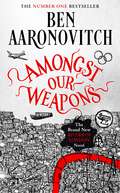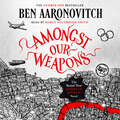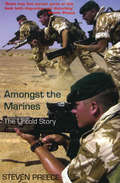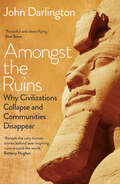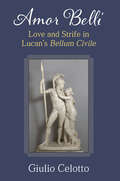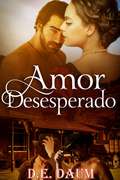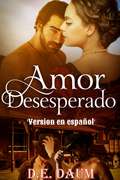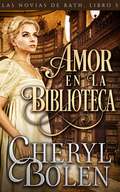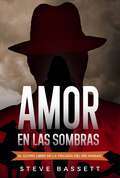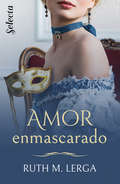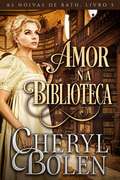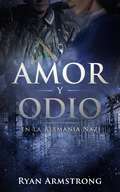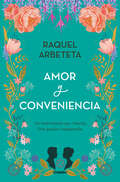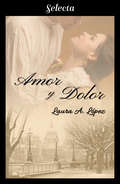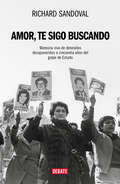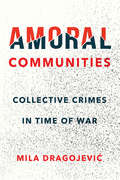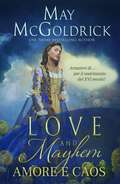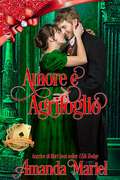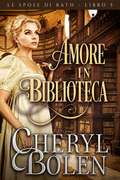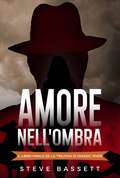- Table View
- List View
Amongst Our Weapons: The Brand New Rivers Of London Novel
by Ben AaronovitchTHE BRAND NEW NOVEL IN THE #1 BESTSELLING RIVERS OF LONDONThere is a world hidden underneath this great city...The London Silver Vaults - for well over a century, the largest collection of silver for sale in the world. It has more locks than the Bank of England and more cameras than a celebrity punch-up. Not somewhere you can murder someone and vanish without a trace - only that's what happened.The disappearing act, the reports of a blinding flash of light and memory loss amongst the witnesses all make this a case for Detective Constable Peter Grant and the Special Assessment Unit.Alongside their boss DCI Thomas Nightingale, the SAU find themselves embroiled in a mystery that encompasses London's tangled history, foreign lands and, most terrifying of all, the North!And Peter must solve this case soon because back home his partner Beverley is expecting twins any day now. But what he doesn't know is that he's about to encounter something - and somebody - that nobody ever expects...Effortlessly original, endlessly inventive and hugely entertaining - step into the world of the much-loved, Number One bestselling Rivers of London series.* * * * *PRAISE FOR BEN AARONOVITCH & THE RIVERS OF LONDON SERIES:'Highly entertaining'SUNDAY EXPRESS'Charming, witty, exciting'THE INDEPENDENT'Ben Aaronovitch has created a wonderful world full of mystery, magic and fantastic characters. I love being there more than the real London'NICK FROST'As brilliant and funny as ever ... Masterfully crafted - gives the late, great Terry Pratchett a run for his money'THE SUN'An incredibly fast-moving magical joyride for grown-ups'THE TIMES'Funny and wildly inventive'MAIL ON SUNDAYDiscover why this incredible series has sold over two million copies worldwide. If you're a fan of Terry Pratchett, you will love the imaginative, irreverent and all-round irresistible RIVERS OF LONDON books.
Amongst Our Weapons: The Brand New Rivers Of London Novel
by Ben AaronovitchTHE BRAND NEW NOVEL IN THE #1 BESTSELLING RIVERS OF LONDON SERIESThere is a world hidden underneath this great city...The London Silver Vaults - for well over a century, the largest collection of silver for sale in the world. It has more locks than the Bank of England and more cameras than a celebrity punch-up. Not somewhere you can murder someone and vanish without a trace - only that's what happened.The disappearing act, the reports of a blinding flash of light and memory loss amongst the witnesses all make this a case for Detective Constable Peter Grant and the Special Assessment Unit.Alongside their boss DCI Thomas Nightingale, the SAU find themselves embroiled in a mystery that encompasses London's tangled history, foreign lands and, most terrifying of all, the North!And Peter must solve this case soon because back home his partner Beverley is expecting twins any day now. But what he doesn't know is that he's about to encounter something - and somebody - that nobody ever expects...Effortlessly original, endlessly inventive and hugely entertaining - step into the world of the much-loved, Number One bestselling Rivers of London series.* * * * *PRAISE FOR BEN AARONOVITCH & THE RIVERS OF LONDON SERIES:'Highly entertaining'SUNDAY EXPRESS'Charming, witty, exciting'THE INDEPENDENT'Ben Aaronovitch has created a wonderful world full of mystery, magic and fantastic characters. I love being there more than the real London'NICK FROST'As brilliant and funny as ever ... Masterfully crafted - gives the late, great Terry Pratchett a run for his money'THE SUN'An incredibly fast-moving magical joyride for grown-ups'THE TIMES'Funny and wildly inventive'MAIL ON SUNDAYDiscover why this incredible series has sold over two million copies worldwide. If you're a fan of Terry Pratchett, you will love the imaginative, irreverent and all-round irresistible RIVERS OF LONDON books.
Amongst the Marines: The Untold Story
by Steven PreeceSteven Preece was a Royal Marine Commando from 1983 to 1990, serving first at entry-level and then as a lance-corporal. Amongst the Marines is Steven's first-hand account of his years as an elite soldier, focusing directly on the excessive and often shocking lifestyle of the Marines during this time, and impact this had on his own personality and behaviour.Preece fulfilled his childhood ambition by earning the coveted Green Beret when he was 18. He was unaware, however, of the brutal rite of passage that awaited him and all the other 'pieces of skin' [new recruits]. Violence in the Marines, as Steven discovered, was not limited to the battlefield but a continual part of a pervasive culture of bullying and aggression. It did not take long for Preece to be accepted into this culture and to adopt it as his own. On duty he was fit, committed and loyal, while off duty he displayed a mammoth capacity for drinking, fighting and womanising. On home leave, Steven found it increasingly hard to adapt to civilian life. His drinking sessions in local pubs frequently ended in fights with the locals and even in violence against members of his own family. Preece earned a reputation amongst his fellow Marines for pranks and dangerous behaviour; and this eventually led him to be court-maritialled. To his relief and surprise, however, Preece was fully acquitted by the court.Amongst the Marines is an unflinching exposé of the culture of the Marines, from foul practical jokes and rough justice to the off-duty orgies of drink, sex and violence. It is a no-holds-barred account of the many shocking incidents Preece witnessed and participated in, from his first day as a new recruit to his exit from the Marines with his reputation intact and his scores settled once and for all.
Amongst the Ruins: Why Civilizations Collapse and Communities Disappear
by John DarlingtonAmongst the Ruins explores the loss of ancient civilizations, the collapse of ruling elites, and the disappearance of more recent communities and their local traditions. Some of these are now sealed under 3,000-year-old peat, others lost to rising seas or sands, and the carcasses of twentieth-century buildings which serve as reminders of the destructive power of war. These compelling stories of fallen or lost places are brought together through themes of war, climate change, natural hazards, human self-destruction, and simple economics. From the ice of the Arctic fringe, through to the desert landscapes of North Africa, by way of South America&’s high mountains and Southeast Asia&’s urban sprawl, Amongst the Ruins charts the rise and fall of places and communities around the world, the fascinating characters associated with them, and the important events that punctuate their history. Exploring wide-ranging examples from prehistory to the present day, John Darlington challenges us to recognize past failures and identify what we need to do to protect the cultures of our current world.
Amor Belli: Love and Strife in Lucan's Bellum Civile
by Giulio CelottoCompelled by the emperor Nero to commit suicide at age 25 after writing uncomplimentary poems, Latin poet Lucan nevertheless left behind a significant body of work, including the Bellum Civile (Civil War). Sometimes also called the Pharsalia, this epic describes the war between Julius Caesar and Pompey.Author Giulio Celotto provides an interpretation of this civil war based on the examination of an aspect completely neglected by previous scholarship: Lucan’s literary adaptation of the cosmological dialectic of Love and Strife. According to a reading that has found favor over the last three decades, the poem is an unconventional epic that does not conform to Aristotelian norms: Lucan composes a poem characterized by fragmentation and disorder, lacking a conventional teleology, and whose narrative flow is constantly delayed. Celotto’s study challenges this interpretation by illustrating how Lucan invokes imagery of cosmic dissolution, but without altogether obliterating epic norms. The poem transforms them from within, condemning the establishment of the Principate and the Julio-Claudian dynasty.
Amor Desesperado
by Dee DawningBem-educada e gentil, Valerie Johnson viaja de trem e diligência desde Boston para se juntar ao marido a cinco mil quilômetros de distância em Virginia City, Nevada, e acaba por descobrir que é viúva. Bem-educada e gentil, Valerie Johnson viaja de trem e diligência desde Boston para se juntar ao marido a cinco mil quilômetros de distância em Virginia City, Nevada, e acaba por descobrir que é viúva. Com pouco dinheiro, incapaz de encontrar um emprego respeitável, ela aceita uma posição temporária como cortesã no Salão da Rosie, um elegante bordel de Virginia City. Quando o deus grego Duke Dugan escolhe Valerie, ambos se perguntam se é luxúria ou amor à primeira vista. Fascinado pela bela prostituta de cabelos flamejantes que ele chama de Ruiva, Duke, desejando aprender mais sobre ela, a leva para jantar no melhor restaurante de Virginia City. Para sua consternação, Valerie descobre que Duke é um capitão rebelde que, junto de seus dois irmãos, está em uma missão desesperada para a desprezível Confederação. Ela o denunciaria às autoridades, exceto por um problema: ela se apaixonou por ele.
Amor belli: Love and Strife in Lucan’s Bellum civile
by Giulio CelottoCompelled by the emperor Nero to commit suicide at age 25 after writing uncomplimentary poems, Latin poet Lucan nevertheless left behind a significant body of work, including the Bellum Civile (Civil War). Sometimes also called the Pharsalia, this epic describes the war between Julius Caesar and Pompey.Author Giulio Celotto provides an interpretation of this civil war based on the examination of an aspect completely neglected by previous scholarship: Lucan’s literary adaptation of the cosmological dialectic of Love and Strife. According to a reading that has found favor over the last three decades, the poem is an unconventional epic that does not conform to Aristotelian norms: Lucan composes a poem characterized by fragmentation and disorder, lacking a conventional teleology, and whose narrative flow is constantly delayed. Celotto’s study challenges this interpretation by illustrating how Lucan invokes imagery of cosmic dissolution, but without altogether obliterating epic norms. The poem transforms them from within, condemning the establishment of the Principate and the Julio-Claudian dynasty.
Amor de contrabando
by Gabriella R. Hayes«Seguramente una mujer bonita nunca se ve más bonita que cuando hace té». Lady Audley’s secret (1862) – Mary Elizabeth Braddon Gran Bretaña, siglo XVIII. En aquellos tiempos, en los que una taza de té era el bien más preciado de la sociedad británica, sus ciudadanos se vieron obligados a causa de los excesivos impuestos sobre la asiática infusión, a iniciarse en el mundo del contrabando. El té se convirtió en la bebida de moda, tanto para las clases altas como las bajas. Tomar té otorgaba un grado de sociabilidad y respeto, así como la alabanza a sus beneficios para la salud. Juliet, es una joven a la que la pérdida de memoria no le permite saber quién es. No recuerda nada de su pasado, absolutamente nada. Por ese motivo, cuando es encontrada inconsciente en un camino a las afueras de Londres por las prostitutas del burdel más lujoso de la ciudad, acaba viéndose obligada a trabajar allí como doncella. Pero el tiempo va pasando en ese lugar de mala muerte, donde los malos tratos y el ambiente lascivo van mermando su ánimo, y sus recuerdos parecen resistirse a volver. Hasta que un buen día, se tropieza con alguien que con solo unas palabras, abre una brecha a su perdida memoria. En ese momento, Juliet se decidirá, a pesar del temor que siente a salir al mundo exterior, a huir de aquel lugar y embarcarse a bordo del Buenaventura en una nueva hazaña por descubrir quién es ella en realidad. Robert Walker, es el apuesto segundo capitán del Buenaventura, un barco mercante de carbón y otras dudosas mercancías que hace su ruta por las costas de Inglaterra. Su fuerte talante iguala a su encantadora sonrisa. Es una líder inteligente y astuto, respetado por sus hombres, que se verá superado al descubrir una bonita polizón escondida en las bodegas de su navío. «¿Quién es ella y porqué está justamente en mi barco?». Las evasivas y mentiras de la joven a sus preguntas lo harán creer que se trata de una espía enviada bajo aquella dulce apariencia para descubrir sus secretos negocios. ¿Podrá Juliet ablandar el corazón del desconfiado y astuto Robert y conseguir descubrir cuál es su pasado? Embárcate junto a ellos en la búsqueda de la verdad, en la búsqueda de un pasado que unirá sus destinos.
Amor desesperado
by D. E. DaumAmor desesperado por D. E. DAUM Bien educada y gentil, Valerie Johnson viaja en tren y diligencia desde Boston para reunirse con su esposo a tres mil millas de distancia en Virginia City, Nevada, solo para descubrir que es una viuda. Bien educada y gentil, Valerie Johnson viaja en tren y diligencia desde Boston para reunirse con su esposo a tres mil millas de distancia en Virginia City, Nevada, solo para descubrir que es una viuda. Con poco dinero, incapaz de encontrar un empleo respetable, acepta un puesto temporal como cortesana en Rosie's Parlour, un elegante burdel de Virginia City. Cuando el dios Duke Dugan elige a Valerie, ambos se preguntan si es lujuria o amor a primera vista. Fascinado por la hermosa prostituta de cabello en llamas que llama Red, Duke, deseando saber más sobre ella, la lleva a cenar al mejor restaurante de Virginia City. Para su consternación, Valerie descubre que Duke es un capitán rebelde, que, junto con sus dos hermanos, está en una misión desesperada por la despreciada Confederación. Le diría a las autoridades, excepto que hay un problema: se ha enamorado de él.
Amor en la Biblioteca: Un amor inesperado, lleno de inteligencia y valor (Serie Las Novias de Bath #5)
by Cheryl BolenEsta maravillosa historia romantica en trama recreada en la época de Regencia inglesa dónde los prejuicios y frivolidades se contrastan con personajes llenos de los más altos valores. Catherine — viuda de Bexley —se encuentra sola y desesperada. Llena de deudas, su única alternativa para salir de su terrible situación es la venta de un antiguo manuscrito. Pero cuando el extraño ejemplar es robado, ella recurrira a la ayuda del académico Melvin Steffington y juntos emprendaran un carrera contra el tiempo no solo para encontrar aquello que le puede salvar la vida a la viuda, sino también para encontrar el amor.
Amor en las sombras: Libro final de la Trilogía del río Passaic (Trilogía del río Passaic #3)
by Steve Bassett"Amor en las sombras", el último libro de la trilogía del río Passaic, lleva al lector desde Newark en 1947 a través de las sombras oscuras donde brutos sin mente de todas las clases se aprovechaban de los indefensos. Las mujeres se defendían y por primera vez el feminismo musculoso estaba cambiando el mundo con Rosie la Remachadora bombeando sus bíceps en carteles de costa a costa. Los hombres ya no eran los únicos que usaban sus puños. Cuatro mujeres maltratadas aterrorizan a la élite de la ciudad cuando reclutan a un mafioso para ayudar a vengarse de hombres poderosos que escaparon del castigo a pesar de años de comportamiento brutal. El jefe de homicidios de la policía de Newark se sorprende al descubrir que no hay diferencia en la agresión y el caos que afecta a los ricos y a los pobres. Una mujer rica y hermosa maltratada físicamente emprende una búsqueda por dos continentes después de que su rico esposo aristócrata golpea fatalmente a un miembro de la familia al que había amado desde la infancia. Dos asesinos internacionales contratados por la mafia también siguen la pista del marido después de descubrir que había malversado dinero de la mafia obtenido invirtiéndolo en las máquinas de guerra de Hitler. El lector descubre que el mal, a menudo disfrazado de amor, acecha en las sombras de todo el mundo.
Amor enmascarado
by Ruth M. Lerga¿Podrá el amor superar al orgullo cuando el pasado es un lastre demasiado doloroso? ¿Será la intensa pasión que se palpa entre ellos suficiente para convencerlos de darse una nueva oportunidad? Ha llegado la hora de que Helena, la hermana del conde de Hentley, sea presentada en sociedad, y no puede contar con dos padrinos más excelsos: su hermano Sebastian, conde de Hentley, y la antigua pupila de este e íntima amiga de la familia, Genoveva Rachôme, una joven duquesa que quedó viuda dos años antes y que cuenta con la mejor de las reputaciones. Lo que nadie sospecha es que, en el pasado, hubo entre ellos sentimientos que nunca llegaron a confesarse. Sebastian detesta a la princesa de hielo en que Veva se ha convertido a su regreso a Inglaterra; Genoveva culpa a Sebastian de haber perdido toda su espontaneidad al forzarla a un matrimonio desgraciado lejos de todo lo que conoce. Durante seis meses van a tener que convivir en la misma casa, preparar a la joven, acudir a las mismas fiestas y simular una buena relación, cuando el rencor y el arrepentimiento campan a sus anchas en cada conversación que mantienen. La discreción, obligada para que la temporada de la pupila de ambos sea un éxito, va a ser un reto, siendo que no pueden estar cerca el uno del otro sin que salten chispas… de odio o de pasión. En los blogs... «A destacar es la ligereza con la que se lee este relato es maravilloso, Ruth M. Lerga hace que lo leas de un suspiro, que te tenga en vilo constantemente y sabe cómo mantener al lector o a la lectora enganchada a la trama. No sabría decir lo que me ha gustado más, pero cuando leo un romance histórico y me doy cuenta de que todo fluye y de que te recreas en las descripciones, pero estas no son tediosas, son maravillosas, me gusta. No quiero contar nada del relato, ya que es bastante fácil de spoilear, pero os lo recomiendo enormemente.»Blog Paseando a Miss Cultura
Amor na Biblioteca: As Noivas de Bath, Livro 5
by Cheryl BolenA Bela e o Erudito. . . A bela, mas pobre viúva, convence o jovem bonito e estudioso a ajudá-la a recuperar o inestimável manuscrito de seu falecido marido que foi roubado, e cuja venda dará a ambos independência financeira. Forças misteriosas planejam impedi-los de alcançar o sucesso, mas a busca os aproxima cada vez mais, do que jamais poderiam ficar um do outro. . .
Amor no Riacho do Lobo
by Ailene FrancesFaíscas voam, mentiras se desenrolam e equívocos que levam ao perigo são cometidos quando um rico pecuarista do Texas esconde sua identidade ao conhecer a filha mimada e rica de um empresário de Nova Orleans que havia sido prometida cegamente em casamento a ele. Aiden é um bonito e sexy dono de fazenda no Texas, que foi abordado por um parceiro de negócios de Nova Orleans para se unir em casamento com a filha dele. Querendo ver sua futura esposa em seu próprio elemento, sem que ela soubesse quem ele era, ele alega ser a pessoa enviada para buscá-la. Pauline é a filha mimada que resiste a casar com um homem que ela tem certeza que se parece com um sapo velho e, depois de se apaixonar pelo cowboy sexy que fora enviado para buscá-la, foge e é capturada por traficantes cruéis. Agora, Aiden deve encontrá-la e resgatá-la... bem como confessar sua verdadeira identidade. Ele a encontrará a tempo de salvá-la de um destino tão cruel? E.... Eles serão capazes de sobreviver aos perigos que os ameaçam, aprender a amar um ao outro e superar tudo isso por uma vida feliz juntos?
Amor y Odio: en la Alemania Nazi
by Ryan ArmstrongSegunda Guerra Mundial: un joven guardia nazi, a quien se le ha asignado un puesto en un gueto de Ratisbona, Alemania, se encuentra en un momento y lugar que detesta. Nunca ha participado directamente en el derramamiento de sangre, pero no ha hecho nada para detenerlo. Se pregunta si su alma encontrará salvación. Cuando le ordenan asesinar a una joven judía, se niega a hacerlo a pesar de las consecuencias y logra salvarle la vida. ¿Quizás la mujer que ha salvado pueda salvarlo a él? Tal vez ella sea la clave de su redención y la luz que guíe su alma de regreso a casa.
Amor y conveniencia
by Raquel ArbetetaUna historia de amor en el pasado para enamorarse en el presente Londres, 1844. Mientras las jóvenes aristócratas se preparan ansiosas para dar con un buen marido, Hope Maude, hija del vizconde Loughry, ha perdido la esperanza. Con su apellido como único aval tras un terrible accidente, los salones de baile ya no tienen nada que ofrecerle. Cayden Dagger es uno de los empresarios más exitosos y acaudalados de la capital inglesa, pero sus orígenes humildes le impiden ser considerado como algo más que un advenedizo. Entre la élite londinense, Cayden tiene un objetivo: encontrar un enlace que le abra por fin las puertas de la cumbre social. Hope y Cayden parecen ser la solución perfecta el uno para el otro. Su unión acabaría de una vez por todas con sus problemas. Es un trato inmejorable. Sin embargo, la complicidad que surge entre ambos los llevará a preguntarse: ¿acaso es posible convertir un matrimonio por conveniencia en amor verdadero? Críticas:«Tierna, sexy y divertida. Ideal para las lectoras de Julia Quinn o Lisa Kleypas».Brenna Watson «Un pacto de conveniencia, el poder de la amistad por encima de los prejuicios y el amor surgiendo cuando menos se espera. La pluma de Raquel Arbeteta hará las delicias de los fans de Los Bridgerton».Abril Camino
Amor y dolor (Rosa blanca #Volumen 3)
by Laura A. LópezTercera entrega de la serie de romance histórico «Rosa blanca». Una nueva novela de Laura A. López en la que los protagonistas tendrán que amar de nuevo superando el pasado y los miedos del presente. <p><p>Bradley Waldow, marqués de Blanford, aún extraña a su amada lady Anne Woods, que falleció a causa de una extraña enfermedad y a él lo dejó sumido en una profunda tristeza. Años después, al ver la felicidad de su hermano gemelo, decide volver a empezar. <p><p> Es entonces cuando a la hermosa, no muy tímida y misteriosa lady Imogen Woods, la hermana pequeña de lady Anne, viéndolo como su protector, le pide que la proteja de un infeliz destino. Sin darle mucha importancia a la enigmática dama, y ante su insistencia, termina convirtiéndose en su salvador... y su gran amor. <p><p>Ambos habrán de enfrentarse a situaciones muy complicadas hasta descubrir al causante de todas las miserias de la familia Woods... Alguien mucho más cercano a ellos de lo que imaginan.
Amor y santidad (El escándalo se encuentra con el amor #7)
by Amanda MarielLa magia del acebo reunirá a Josephine y a Ace en una Navidad inolvidable.... Cuando Josephine y Ace son enviados a buscar todos los adornos necesarios para un baile de Navidad en el salón Fortuna, encuentran más de lo que esperaban. Pero, ¿podrán una costurera y un gorila del infierno del juego encontrar el amor juntos? Disfruta de esta breve historia de travesuras navideñas hoy mismo.
Amor, te sigo buscando: Memoria viva de detenidos desaparecidos a cincuenta años del golpe de Estado
by Richard Sandoval NúñezLas tres historias que componen este libro tratan sobre la búsqueda. De esposos, padres e hijos que durante la sombría dictadura militar fueron detenidos, torturados y hechos desaparecer. Las tres historias que componen este libro tratan sobre la búsqueda. De esposos, padres e hijos que durante la sombría dictadura militar fueron detenidos, torturados y hechos desaparecer. De madres, esposas e hijas que decidieron no callar y que, mediante huelgas de hambre, recursos de amparo y protestas en la vía pública, nunca dejaron de ir tras los pasos de los responsables. De mujeres que bailaron la cueca en soledad, que no tuvieron miedo de los mecanismos de la represión, que decidieron decirle al mundo lo que ocurría en el país. De amores que nunca olvidaron y que hasta hoy exigen justicia y verdad. Las vidas que Richard Sandoval retrata en este libro son memoria viva. Con ellas es posible adentrarse en la historia de La Legua y cómo se resistió allí el 11 de septiembre; en una historia de amor que surgió en la población José María Caro y que dio paso a un baile de resistencia; en la vida de los pobladores de La Victoria y cómo hicieron frente a la precariedad económica y la constante persecución policial. Son historias que no aparecen en los relatos oficiales, que luchan contra el olvido y que no fueron vencidas -ni siquiera medio siglo después- por la impunidad.
Amoral Communities: Collective Crimes in Time of War
by Mila DragojevićIn Amoral Communities, Mila Dragojević examines how conditions conducive to atrocities against civilians are created during wartime in some communities. She identifies the exclusion of moderates and the production of borders as the main processes. In these places, political and ethnic identities become linked and targeted violence against civilians becomes both tolerated and justified by the respective authorities as a necessary sacrifice for a greater political goal.Dragojević augments the literature on genocide and civil wars by demonstrating how violence can be used as a political strategy, and how communities, as well as individuals, remember episodes of violence against civilians. The communities on which she focuses are Croatia in the 1990s and Uganda and Guatemala in the 1980s. In each case Dragojević considers how people who have lived peacefully as neighbors for many years are suddenly transformed into enemies, yet intracommunal violence is not ubiquitous throughout the conflict zone; rather, it is specific to particular regions or villages within those zones. Reporting on the varying wartime experiences of individuals, she adds depth, emotion, and objectivity to the historical and socioeconomic conditions that shaped each conflict.Furthermore, as Amoral Communities describes, the exclusion of moderates and the production of borders limit individuals' freedom to express their views, work to prevent the possible defection of members of an in-group, and facilitate identification of individuals who are purportedly a threat. Even before mass killings begin, Dragojević finds, these and similar changes will have transformed particular villages or regions into amoral communities, places where the definition of crime changes and violence is justified as a form of self-defense by perpetrators.
Amore E Caos (Serie della Famiglia Macpherson)
by Jan Coffey May McGoldrickLa grande sala di Fleet Tower è un luogo molto vivace. I McCall si stanno preparando per un matrimonio e se questo significa arrivi inaspettati, omicidi, scompiglio e caos, tanto meglio in questa «commedia da sbellicarsi dalle risate». Provate un po' a sposarvi, quando la vostra promessa sposa sa maneggiare una pentola di ferro con una precisione mortale, suo zio pazzo pensa di essere William Wallace e le sue due zie nubili non riescono a finire una frase o un pensiero da sole… Sono questi, i problemi di Sir Iain Armstrong, quando si accinge a sposare Lady Marion, una donna tutto pepe cresciuta in convento. Tutto ciò che Iain vuole fare è esaudire i desideri dei loro padri, placare due corti reali e fare ciò che è meglio per il futuro della Scozia, ponendo fine a tutti i problemi nella sua parte dei Borders. Tutto ciò che lei deve fare è accettare di sposarlo, che è l'ultima cosa a cui pensa, quando Iain arriva al convento. Non si farà prendere senza combattere. E anche quando Lady Marion si renderà conto che Iain è un uomo coraggioso, intelligente e dalle spalle seducenti, riuscirà la sua eccentrica famiglia a fare quello che i suoi scatti d'ira, i suoi modi ostinati e il suo orgoglio non sono riusciti a fare finora: allontanarlo per sempre?
Amore e Agrifoglio (lo scandalo incontra l'amore #7)
by Amanda MarielLa magia dell'agrifoglio farà incontrare Josephine e Ace perché vivano insieme un Natale indimenticabile... Quando a Josephine e Ace viene chiesto di andare a cercare tutte le decorazioni necessarie per il ballo di Natale a Fortuna's Parlor, trovano più di quello che si aspettavano. Ma una sarta e un buttafuori di una sala da gioco possono davvero innamorarsi l'uno dell'altra? Concediti oggi la lettura di questo breve racconto natalizio di storici intrighi.
Amore e vendetta (Regency Hearts Aflame #1)
by Amanda MarielTra i sussurri scandalosi dell'Inghilterra Regency, la ricerca di vendetta di lady Selina Whitcombe si intreccia con la lotta disperata dell'enigmatico visconte James Blackwood per riabilitare il proprio nome, mentre entrambi scoprono che la strada per la redenzione è lastricata di passione inaspettata e di verità a lungo sepolte. Nell'incantevole abbraccio di una primavera inglese, il destino di lady Hollyfield, Selina Whitcombe, prende una svolta fatale quando la vita del marito finisce in tragedia, avvolta nel sospetto. Il dolore diventa il compagno implacabile di Selina e una convinzione radicata mette radici in lei: l'affascinante visconte Blackwood è l'artefice della fine del marito. Così inizia la sua inflessibile ricerca di vendetta. Il visconte Blackwood, James Barton, rinomato per il suo fascino carismatico e la sua storia enigmatica, si ritrova sia affascinato che sfidato dall'incrollabile ricerca di Selina. Le accuse danzano come ombre, la tensione aumenta e in mezzo alla mischia emerge un'attrazione inespressa, che li lega in una battaglia che trascende il semplice intelletto. Mentre segreti e sussurri si intrecciano per dare forma a un'intricata rete di incertezza, calpestano il terreno insidioso di una società immersa nello scandalo. A ogni incontro, il confine tra vendetta e desiderio si confonde, accendendo una passione che è impossibile nascondere. Il passato di James, uno spettro che lo perseguita, risuona nel cuore gelido di Selina mentre la sua inaspettata gentilezza scongela il suo mondo. Eppure, proprio mentre il perdono e la comprensione chiamano, emergono rivelazioni di proporzioni sbalorditive, che minacciano di rompere il fragile legame che hanno tessuto. Il percorso di Selina deve intersecarsi con dolorose verità, mentre James lotta contro i propri demoni nel tentativo di reclamare l'innocenza. In un mondo in cui reputazione e scandalo si intrecciano, Selina e James riusciranno a superare la loro storia condivisa di ang
Amore in biblioteca (Le spose di Bath, libro quinto #5)
by Cheryl BolenLa bella e lo studioso. Una vedova in disgrazia persuade uno studioso ad aiutarla a recuperare l'inestimabile manoscritto che suo marito le ha lasciato in eredità, che le è stato rubato e la cui vendita permetterebbe a entrambi di ottenere l'indipendenza finanziaria. Forze misteriose lavorano contro di loro, ma la loro comune ricerca li porta ad avvicinarsi più di quanto non siano stati a nessun altro...
Amore nell'ombra: il libro finale de La trilogia di Passaic River, (La Trilogia di Passaic River #3)
by Steve Bassett"Amore nell'ombra", il libro finale de La trilogia di Passaic River, porta il lettore tra le ombre oscure della Newark del 1947 dove bruti senza cervello di tutte le classi se la prendono con gli indifesi. Le donne stanno cominciando a reagire e per la prima volta il femminismo muscolare alza la testa per cambiare il mondo e così Rosie la Rivettatrice mostra i suoi bicipiti sui manifesti da una costa all'altra e gli uomini non sono più gli unici ad usare i pugni. Quattro donne maltrattate gettano nel panico l'élite della città arruolando un gangster mafioso per vendicarsi di uomini potenti sfuggiti alla condanna nonostante anni di comportamenti violenti. Il capo della omicidi della polizia di Newark è stupito nello scoprire che non c'è alcuna differenza nelle percosse e nelle loro dirette conseguenze tra ricchi e poveri. Una donna ricca e bella, maltrattata fisicamente, parte alla ricerca attraverso due continenti del suo ricco marito aristocratico che ha brutalmente picchiato un membro della famiglia che lei amava fin dall'infanzia per vendicarne la morte. Sulle tracce del marito ci sono anche due killer internazionali assunti da Cosa Nostra dopo che si è scoperto che aveva sottratto denaro alla mafia guadagnato investendo nella macchina da guerra di Hitler. Il lettore scoprirà che il male, spesso mascherato da amore, si nasconde nell'ombra in tutto il mondo.
